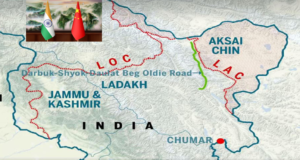 New Delhi: In a significant development, India and China have committed to accelerating their efforts to achieve complete disengagement in the remaining contested areas along their border. This agreement was reached during a high-level meeting between Indian National Security Adviser Ajit Doval and Wang Yi, a key member of the Communist Party of China’s Political Bureau and Director of the Office of the Central Foreign Affairs Commission. The talks took place today in Saint Petersburg, Russia, on the sidelines of the BRICS High-Ranking Officials Responsible for Security Matters and National Security Advisers summit.
New Delhi: In a significant development, India and China have committed to accelerating their efforts to achieve complete disengagement in the remaining contested areas along their border. This agreement was reached during a high-level meeting between Indian National Security Adviser Ajit Doval and Wang Yi, a key member of the Communist Party of China’s Political Bureau and Director of the Office of the Central Foreign Affairs Commission. The talks took place today in Saint Petersburg, Russia, on the sidelines of the BRICS High-Ranking Officials Responsible for Security Matters and National Security Advisers summit.
The Ministry of External Affairs reported that both nations underscored the importance of peace and tranquility along the Line of Actual Control (LAC) for the normalization of their bilateral relationship. They reiterated the necessity of adhering to previous agreements, protocols, and mutual understandings. The discussions provided an opportunity to review ongoing efforts aimed at resolving outstanding issues along the LAC, with the goal of stabilizing and improving bilateral ties.
External Affairs Minister S. Jaishankar, speaking from Geneva where he is attending bilateral meetings, indicated that significant progress has been made in addressing the disengagement challenges. According to Jaishankar, approximately 75% of the disengagement issues have been resolved. However, he highlighted ongoing concerns about the militarization of the frontier, a situation exacerbated by the Galwan Valley clashes in June 2020, which have had a profound impact on India-China relations.
Jaishankar emphasized that while partial disengagement has been achieved in areas like Galwan, Hot Springs, and Gogra, and complete disengagement was realized at the north and south banks of Pangong Lake, challenges persist. Notably, Chinese forces remain entrenched in the Depsang Plains in northeastern Ladakh. The LAC, which spans about 3,500 kilometers and includes areas under Chinese control in Tibet, continues to be a major point of contention.
During his visit to Switzerland, Jaishankar is expected to meet with Chinese Foreign Minister Wang Yi to further discuss the ongoing diplomatic and military talks. He expressed hope that resolving the disengagement issue and restoring peace and tranquility could pave the way for broader improvements in bilateral relations.
The ongoing negotiations, which began in February 2021, represent a crucial step in addressing the complexities of the border dispute. Jaishankar noted that the current engagement aims to return both countries’ troops to their normal operating bases, with arrangements for regular patrolling given the lack of a legally delineated border. He described the situation as dangerous, noting that the heavy troop presence in extreme conditions could lead to mishaps, as evidenced by the clashes in Galwan.
As both nations continue their diplomatic and military dialogues, there remains a cautious optimism that a resolution to the disengagement process will lay the groundwork for a more stable and constructive relationship.



